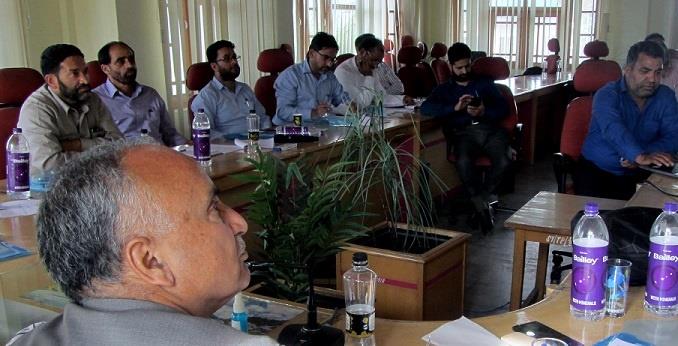SCERT seeks expert guidance for framing rules, regulations to implement RTE-2009
SRINAGAR: The State Council of Educational Research and Training (SCERT), Jammu and Kashmir, on Thursday invited scores of academicians and experts to participate in a 3-day workshop regarding framing of rules and guidelines for implementation of Right of Children to Free and Compulsory Education Act, 2009.
The workshop, which is being conducted at Jammu and Kashmir Board of School Education (JKBOSE) auditorium, was earlier inaugurated by Director SCERT, J&K, Professor Veena Pandita.
Former Director School Education Kashmir, Mohammad Rafi, who is also the Chairperson of advisory council to private schools’ association and Principal Degree College, Pampore, Professor Seema Naz are among a galaxy of experts participating in the workshop besides senior JKBOSE officials including Assistant Director Academics Dr Arif Jan and Joint Secretary Publications, Professor Abdul Wahid Makhdoomi also taking part in the event.
Professor Pandita hailed the decision of School Education Department for entrusting responsibility of holding the workshop cum consultative meet to SCERT, J&K, who has sought suggestions on the RTE Act, Rules 2020 drafted by School Education Department and vetted by Department of Law (J&PA).
Pertinently, the RTE Act, 2009 has been extended to the UT under J&K Reorganization Act, 2019 which focuses on compulsory and free education to all children up to the age of 14. It has special provisions for admission of out-of-school children including the enhancement of learning abilities of children at an early age.
Professor Pandita impressed upon the participants to thoroughly examine the draft of RTE Act Rules, 2020 and provide candid suggestions required for incorporating in the draft Act so that the same could be submitted to the School Education Department for making the required necessary changes.
“The implementation of the Right of Children to Free and Compulsory Education Act is mandatorily required in the UT of J&K at the earliest in the best interest of the children at par with other states/UTs wherein the said Act is being already implemented in letter and spirit,” she maintained.
While tracing the history of many different Acts with regard to education in Jammu and Kashmir right from the time Maharaja Hari Singh ruled here, former Director School Education, Mohammad Rafi, said that RTE Act 2009 was replete with opportunities and entitlements that we’ve sadly been unable to cash on.
“I’ve read the Act and we can implement it with our eyes shut,” Rafi, while hailing the Act as “futuristic and flexible document”, said. “Actually, this act provides a wide range of entitlements, rights, facilities, concessions, incentives and protections for the children.” He said contextualization of educational requirements of our children is very much heeded in the Act.
“The Act offers us a host of liberties including framing our own curriculum as per our local needs,” Rafi asserted while appreciating the open-mindedness of the government in passing the Act.
Principal Degree College, Pampore, Professor Seema Naz, outlined various challenges including decline in enrolment in government run schools. “The implementation of much-needed Act assumes greater significance in the light of a steep decline in the enrolment vis-à-vis a catastrophic dropout rate in the government schools,” she added.
Dr. Mudasir Gul of the Education Research and Survey Assessment (ERSA) Wing of the SCERT, Srinagar, presented several Power Point Presentations during the discussion that helped the participants to lay a firm grip on the subject.
The participants deliberated for several hours in the second session of the workshop and outcome of the workshop would be presented to the government in the shape of a document.

